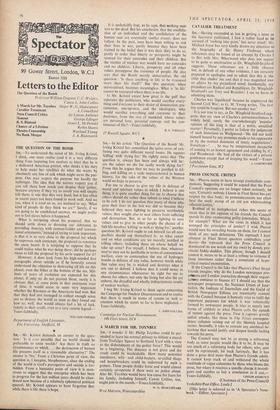SIR,—Mr. Kristol demands an answer to the ques- tion: 'Is
it ever possible that no world should be preferable to some worlds? Are there in truth no circumstances to which ... the destruction of human life presents itself as a reasonable alternative?' The answer is 'No.' From a Christian point of view, the question is, I imagine, blasphemous, since the ending of the world is God's prerogative and suicide is for- bidden. From a humanist point of view it is mon- strous to suggest that the enterprise which has been in progress for the last million years should be aban- doned now because of a relatively ephemeral political quarrel. Mr. Kristol appears to have forgotten that while there is life there is hope. It is undeniably (rue, as he says, that nothing mat- ters to the dead. But his conclusion, that the annihila- tion of an individual and the annihilation of the human race are essentially similar events, does not follow. In the past, men have been willing to risk their lives in war, partly because they have been trained to the belief that it was their duty to do so, partly in order that liberty or prosperity might be secured for their comrades and their children. But the victims of nuclear war would have no comrades and no children. Liberty, prosperity and all other values presuppose the existence of people. He also says that the Bomb merely universalises the old question : 'Is there anything in life to be treasured more than life itself?' But this question, when universalised, becomes meaningless. What is 'in life' cannot be treasured where there is no life.
Is Mr. Kristol aware how great is the gulf that separates the politicians, who would sacrifice every- thing and everyone to their desire of domination, pre- eminence, one-up-ness, and the ideologues, who would sacrifice everything and everyone to their doctrines, from the rest of mankind, whose values are personal love, personal courage and the con- tinuance of life?—Yours faithfully, C. C. WRIGLEY 27 Russell Square, WC 1














































 Previous page
Previous page